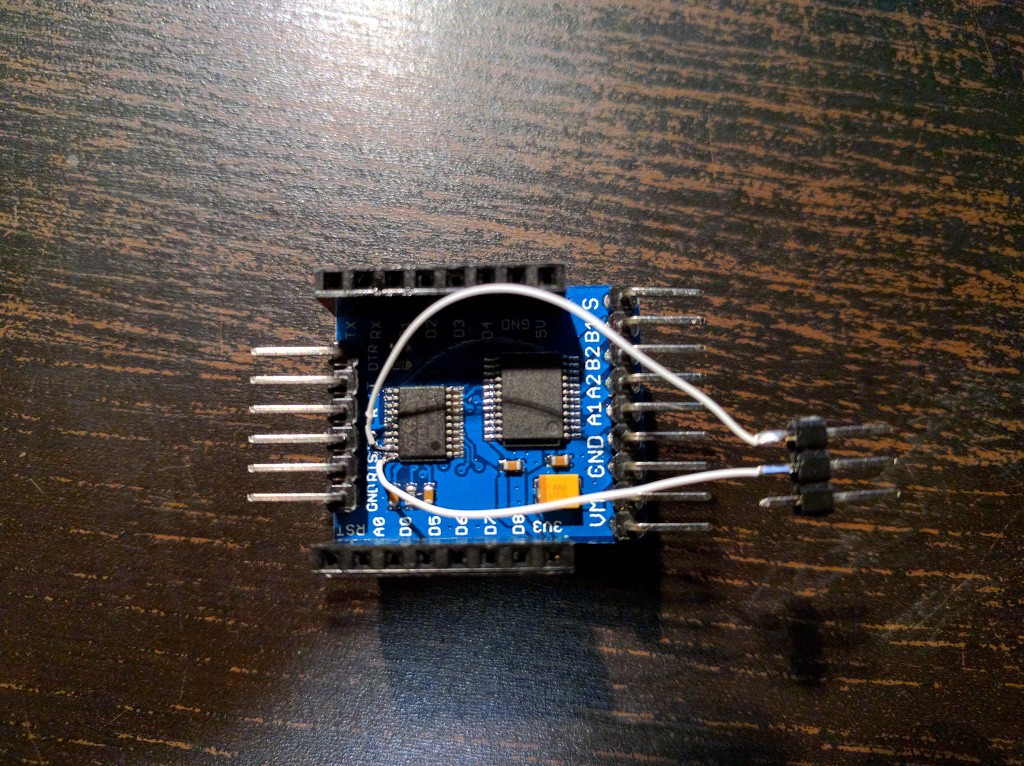@Piotr Bugalski has recently re-written the firmware for this motor shield, and published it at https://github.com/pbugalski/wemos_motor_shield. From what I can tell, the new firmware is compatible with the old one, minus the hanging and crashing, so it should be perfect for a drop-in replacement.
Here is how you can flash it to your shield:
Solder two wires to the first two legs of the microcontroller, counting from the top, like this:
 Be careful to not short them with the legs next to them. This is probably the hardest part.
Be careful to not short them with the legs next to them. This is probably the hardest part.
Next, connect you ST-Link programmer as follows:
SWCLK ↔ first wire
SWDIO ↔ second wire
GND ↔ GND
3V3 ↔ 3V3
T_JRST ↔ RST
Note that, this is with the shiled *not* connected to the D1 Mini.
Now, clone the repository:
$ git clone https://github.com/pbugalski/wemos_motor_shield $ cd wemos_motor_shield
Make sure you have installed openocd and arm-none-eabi-gcc. Compile the firmware:
$ make arm-none-eabi-gcc -Wall -g -std=c99 -Os -mlittle-endian -mcpu=cortex-m0 -march=armv6-m -mthumb -ffunction-sections -fdata-sections -Wl,--gc-sections -Wl,-Map=motor_shield.map -Iinc src/startup_stm32.s src/main.c src/user_i2c.c src/tb6612.c -o motor_shield.elf -Tstm32f030.ld arm-none-eabi-objcopy -O binary motor_shield.elf motor_shield.bin arm-none-eabi-size motor_shield.elf text data bss dec hex filename 2032 1084 1056 4172 104c motor_shield.elf
And flash it onto the shield:
$ make program openocd -f stm32f0motor.cfg -f stm32f0-openocd.cfg -c "stm_flash motor_shield.bin" -c shutdown Open On-Chip Debugger 0.9.0 (2015-09-02-10:42) Licensed under GNU GPL v2 For bug reports, read http://openocd.org/doc/doxygen/bugs.html Info : The selected transport took over low-level target control. The results might differ compared to plain JTAG/SWD adapter speed: 1000 kHz adapter_nsrst_delay: 100 none separate srst_only separate srst_nogate srst_open_drain connect_deassert_srst Info : Unable to match requested speed 1000 kHz, using 950 kHz Info : Unable to match requested speed 1000 kHz, using 950 kHz Info : clock speed 950 kHz Info : STLINK v2 JTAG v17 API v2 SWIM v4 VID 0x0483 PID 0x3748 Info : using stlink api v2 Info : Target voltage: 3.490340 Info : stm32f0x.cpu: hardware has 4 breakpoints, 2 watchpoints stm_erase target state: halted target halted due to debug-request, current mode: Thread xPSR: 0xc1000000 pc: 0xfffffffe msp: 0xfffffffc auto erase enabled Info : device id = 0x10006444 Info : flash size = 16kbytes target state: halted target halted due to breakpoint, current mode: Thread xPSR: 0x61000000 pc: 0x2000003a msp: 0xfffffffc wrote 4096 bytes from file motor_shield.bin in 0.287988s (13.889 KiB/s) target state: halted target halted due to breakpoint, current mode: Thread xPSR: 0x61000000 pc: 0x2000002e msp: 0xfffffffc verified 3116 bytes in 0.057512s (52.910 KiB/s) shutdown command invokedNow, disconnect everything. Your board has the new firmware on it. You can test it, and then desolder the two wires -- you won't be needing them anymore.
 deʃhipu
deʃhipu
Discussions
Become a Hackaday.io Member
Create an account to leave a comment. Already have an account? Log In.
I needed an extra step, as my motor shield was locked. So, in order to flash I needed to issue a "stm32f1x unlock 0" to unlock, power cycle, then I could 'make program'
P.S. I also had a problem with the reset pin, but adding "reset_config none separate" to the start of stm32f0-openocd.cfg solved that.
Oh, and by the way, the serial method didn't work for me. Probably because the firmware was locked.
Are you sure? yes | no
That is weird, it did work for me on a locked shield. In fact, the first two commands are supposed to unlock it.
Are you sure? yes | no
Say, does the serial programming work once you have unlocked it? Can you check?
Are you sure? yes | no
Serial programming does not work for me before or after unlocking. I also tried various combinations of '-m' with a 3.3v FTDI cable.
I'm absolutely delighted to have that new firmware though! Thanks. I might get some pogo-pins or something to make the process easier though, soldering to those tiny pins is a bit of a pain.
Are you sure? yes | no
That's weird. Are you sure you shorted the RTS pin to 3V3?
Are you sure? yes | no